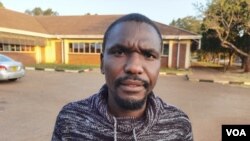A new app is helping Zimbabwe’s journalists stay safe in environments in which they are at risk.
Set up by the Media Institute of Southern Africa (MISA), the tool acts as a panic button. It is seen as an important resource leading up to the country’s 2023 elections.
Nompilo Simanje, from MISA Zimbabwe, said the media watchdog set up the app after documenting a trend of unlawful detentions and assaults against journalists.
“So in light of those trends, which have seen to actually increase during election periods, MISA Zimbabwe launched this alert button," Simanje said. "It is very timely and it will be very useful with the general election coming up next year and also for the purposes of reporting any media violence and calling for assistance in the event of any media violation.”
Journalists in distress can press a ‘Trigger" icon on the app, which immediately alerts MISA and key contacts to the emergency and the person’s location.
Blessed Mhlanga, a journalist with the Alpha Media Holdings news group, has already signed up for the app. Mhlanga, who was arrested in early May, said he could see the value of being able to seek help quickly.
“I was arrested just a few weeks ago while covering elections in Chitungwiza," he said. "There was an amazing response from MISA Zimbabwe and Zimbabwe Lawyers for Human Rights, chiefly because when we were arrested, there were some journalists who then made calls and we managed to get quick responses. But imagine if there was no one around.”
When President Emmerson Mnangagwa took over in 2017, he promised to improve the media landscape in Zimbabwe. But Reporters Without Borders said levels of violence against journalists “remain alarmingly high” in Zimbabwe, and harsh laws are still in effect.
On Monday, Nick Mangwana, permanent secretary in the Ministry of Information, told reporters the government was promoting “development” journalism – stories focused on the economy, climate change and infrastructure. He said authorities were not standing in the way of journalists’ work.
“It is very important and paramount that the welfare of journalists should be elevated to a level where it becomes an integral [part] of the developmental project that is being rolled by government," he said, "because the media are a key component of creating the critical mass buy-in from the public to the national development goals.”
Mangwana promised a Media Practitioners’ Bill in parliament “soon” as part of efforts by the government to allow journalists like Mhlanga to work freely in Zimbabwe.
The ability of media to work unhindered is vital as Zimbabwe prepares for elections next year. During that time, Mhlanga said, the MISA app will be an asset.
“It is going to be very useful," he said. "And it comes as a relief and guarantee to me as a journalist.”
Reporters Without Borders recently ranked Zimbabwe 137th out of 180 countries on its annual index, where 1 is the most free.


